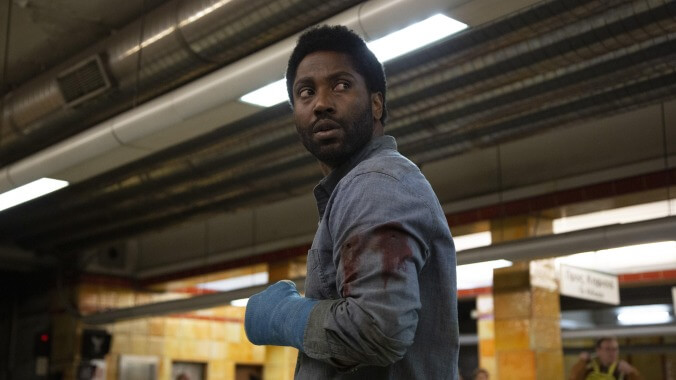John David Washington gets his own The Fugitive in the forgettable Netflix thriller Beckett
Boyd Holbrook, Vicky Krieps, and Alicia Vikander costar in a manhunt movie with a sluggish pulse.


“The Fugitive but with millennials” could be the log line of Ferdinando Cito Filomarino’s Beckett, which casts John David Washington as a future Wife Guy targeted by Greek police after a tragic accident. The film leverages the actor’s physicality to ratchet its on-the-lam tension. But a by-the-numbers narrative and a third act that mistakes cynicism for paranoia land Beckett in the company of other initially suspenseful, ultimately forgettable Netflix thrillers like In The Shadow Of The Moon and The Earthquake Bird, both of which starred a member of this movie’s supporting cast.
The second film this summer, after Hitman’s Wife’s Bodyguard, to unexpectedly focus on Greek economics as a major plot point, Cito Filomarino’s second feature places American couple Beckett (Washington) and April (Alicia Vikander) in the European country on an ebullient vacation. She wants to do and see everything, and he wants to do and see everything with her—including changing their plans at the last minute to leave Athens and explore the pastoral countryside. Kevin A. Rice’s script emphasizes that Beckett and April are in a haze of affection and attraction: “I’m having a love attack, currently,” is a line Washington can barely deliver with a straight face. The two stars don’t have nearly enough chemistry, but their bond is tender.
A late-night accident destroys the idyllic romance, setting Beckett on the run. With Greek police detective Xenakis (Panos Koronis) leading the manhunt, Beckett scrambles to understand why he’s being targeted. Does it have to do with the two people he saw the night of the accident and whom Xenakis insists don’t exist? The film doesn’t translate much of the Greek dialogue uttered by the pursuers, and the result is an omnipresent disquietude and othering, amplified by the fact that Beckett is the only Black person we ever see on screen, constantly watched and whispered about. As he tries to make it to the United States Embassy, the political climate around him roils. Activist Lena (Vicky Krieps) fills Beckett in on a kidnapping plot, protests converging in Athens, and a violent rift between the country’s leftists and right-wingers. How did a computer sales guy from Ohio get caught up in the middle of all this?
Cinematographer Sayombhu Mukdeeprom (who worked with Cito Filomarino on his 2015 film Antonia and on Call Me By Your Name and Suspiria with Beckett producer Luca Guadagnino) portrays the Greek countryside an increasingly injured Beckett staggers across as simultaneously beautiful and threatening. Craggy mountains, dense forests, and a lonely clifftop all serve as obstacles to his freedom. A grappling match, a knife fight, and a tussle over a gun are when Washington’s casting makes the most sense; editor Walter Fasano privileges the former athlete’s physicality by drawing out action sequences and letting them linger. Washington isn’t particularly graceful in this role, but a lack of finesse is the point—it’s a manifestation of the character’s desperation. If only the star matched that quality in the emotion department.
The Beckett character is sparsely written, and the sometimes bland performance Washington delivers doesn’t fill in many characterization gaps; it’s a problem that affects the pacing, too. When Washington is alone and stationary, wallowing in grief or stewing in anger, the movie drags, no matter how gorgeous the scenery around him remains. Beckett moves at a brisker clip when Washington has someone else to bounce off of, like Boyd Holbrook, who plays a U.S. Embassy employee trying to make sense of Beckett’s story. The film also benefits from fleeting injections of humor, as when a disappointingly underutilized Krieps notes, in her best deadpan delivery, that a fair-skinned, blond-haired assassin they’ve narrowly evaded “certainly looked like a fascist.”
The last half-hour of so of the movie becomes a mess of conflicting political interests and convoluted plotting, with a villain whose both-sides ideological stance deflates the paranoid vibe rather than enhancing it. Worse, the film fails to capitalize on the intriguing early suggestion (intensified by jarring strings on the score) that Beckett’s sense of self-preservation isn’t reactive so much as motivated by a morally murky side of his personality. Beckett abandons this more complex possibility, opting instead to weave and then anticlimactically unravel a web around its titular protagonist. It leaves you pining for an on-the-run thriller that doesn’t run from its most interesting elements.